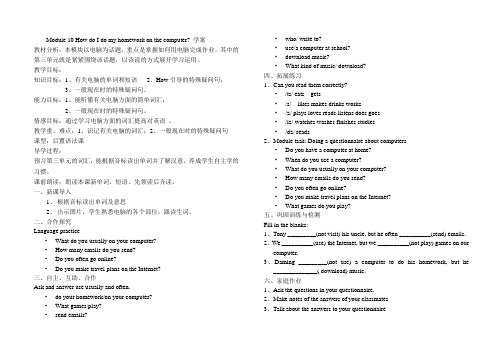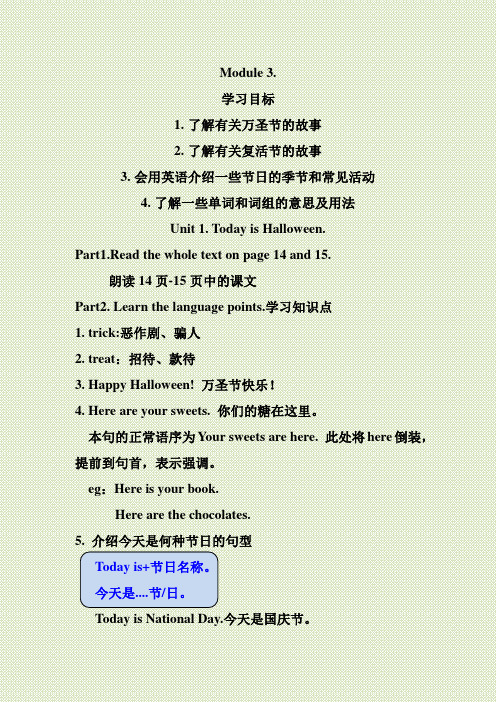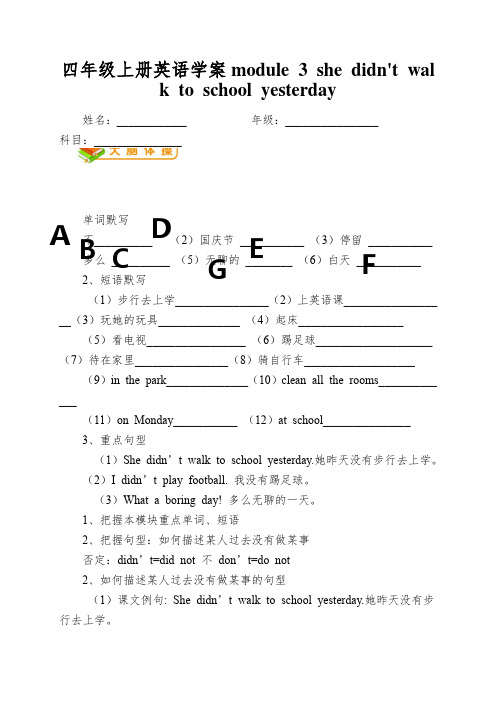Module3学案
初一英语~Module 学案3

Module 10 How do I do my homework on the computer? 学案教材分析:本模块以电脑为话题,重点是掌握如何用电脑完成作业。
其中的第三单元就是紧紧围绕该话题,以读说的方式展开学习运用。
教学目标:知识目标:1、有关电脑的单词和短语2、How引导的特殊疑问句;3、一般现在时的特殊疑问句。
能力目标:1、能听懂有关电脑方面的简单词汇;2、一般现在时的特殊疑问句。
情感目标:通过学习电脑方面的词汇提高对英语。
教学重、难点:1、识记有关电脑的词汇;2、一般现在时的特殊疑问句课型:后置语法课导学过程:预习第三单元的词汇,能根据音标读出单词并了解汉意,养成学生自主学的习惯。
课前朗读;朗读本课新单词、短语。
先领读后齐读。
一、新课导入1、根据音标读出单词及意思2、出示图片,学生熟悉电脑的各个部位。
跟读生词。
二、合作探究Language practice•What do you usually on your computer?•How many emails do you send?•Do you often go online?•Do you make travel plans on the Internet?三、自主、互助、合作Ask and answer use usually and often.•do your homework/on your computer?•What games/play?•send emails?•who/ write to?•use/a computer at school?•download music?•What kind of music/ download?四、拓展练习1、Can you read them correctly?•/ts/ eats gets•/s/ likes makes drinks works•/z/ plays loves reads listens does goes•/iz/ watches washes finishes studies•/dz/ reads2、Module task: Doing a questionnaire about computers•Do you have a computer at home?•When do you use a computer?•What do you usually on your computer?•How many emails do you send?•Do you often go online?•Do you make travel plans on the Internet?•What games do you play?五、巩固训练与检测Fill in the blanks:1、Tony _________(not visit) his uncle, but he often __________(send) emails.2、We __________(use) the Internet, but we __________(not play) games on ourcomputer.3、Daming _________(not use) a computer to do his homework, but he______________( download) music.六、家庭作业1、Ask the questions in your questionnaire.2、Make notes of the answers of your classmates3、Talk about the answers to your questionnaire。
Module 3 Unit 1 What are they doing? 学案(含答案).doc

Title: Module 3 Unit 1 What are they doing?Topic: In the Park.学习目标1. 学会运用句型:What are they doing? They are doing ….谈论正在发生的事情。
2. 学会认读、理解、运用单词和词组:on, in, under, doing taijiquan, rowing a dragon boat, playing chess, drinking soybean milk学习重点句型:What are they doing? They are doing ….【预习导航】一、温故知新(一)写出下面人称代词的中文意思。
(B)I you he she it we they(二)选择am, is ,are填空。
(A)1. I reading a book.2. She watching TV.3. She talking to her friend.4. It running.5. We playing football.6. They singing.7. What you doing? 8. My father taking pictures.(三)写出下面动词的现在分词。
(A)do row play drink二、新知探究(一)听录音,跟读单词3遍。
然后合上书,写出下面单词的中文意思。
(A)1. let’s2. get on3. lots of4. interesting5. thing6. look at7. people8. park9. lake 10. row11. boat 12. men 13. chess 14. drink 15. hungry(二)听录音,跟读Unit 1课文3遍,写出下面词组的中文意思。
(B)1. get on the bus2. interesting things3. in the park4. on the lake5. under the tree6. doing Taijiquan7. rowing a boat 8. playing chess 9. drinking soybean milk(三)写出下面句子的中文意思。
Module3Unit3Languageinuse学案初中英语七年级上册

Module 3 Unit 3 Language in use◎课时重点:会运用there be句型的一般疑问句形式及其答语;会运用how many句型对可数名词进行提问。
【预习导学】一、填一填1.在左边2.一张我们学校的地图3.像这样4.去上学5.离开学校二、译一译1.我们班有30个学生。
______________________________________________________________2.有一张世界地图吗?______________________________________________________________3.你们班有多少学生?______________________________________________________________4.讲桌在哪里?______________________________________________________________5.全世界大部分国家的孩子在5、6岁的时候必须去上学。
______________________________________________________________三、想一想1.总结一下there be句型的肯定句、否定句、一般疑问句及答语的构成。
肯定句:否定句:一般疑问句:肯定答语:否定答语:2.There are ten desks in the classroom. 分别对句中ten和ten desks提问,问句是什么?对ten提问:对ten desks提问:【答案】一、1.on the left2.a map of our school3.like this4.go to school5.leave school二、1.There are thirty students in our class.2.Is there a map of the world?3.How many students are there in your class?4.Where is the teacher's desk?5.In most countries around the world, children must go to school when they are 5 or 6 years old.三、1.There is/are +名词+地点.There isn't/ aren't +名词+地点.Is/Are there +名词+地点?Yes, there is/are.No, there isn't/aren't.2.How many desks are there in the classroom?What's in the classroom?【合作探究】任务驱动一口语练习1.根据课本P18上1的内容,在小组里结对进行对话练习,可以根据自己学校和班级的实际情况进行回答练习,然后每组派代表进行展示。
Module3练习学案

复习检测一、单词拼写根据下面各题括号里汉语和首字母提示和句子的意思,写出英语单词的恰当形式1. We were _____ (打败)last time.2. They will be _______(允许)to watch the match tonight .3. They’ve got no __________(机会)to win this match .4. Liu Xiang is a ___________(代表)of China’s international sporting success.5. Yao Ming is not an _______(突如其来的)success .6. Will Liu Xiang be ______(鼓励)to spend more time awayfrom sport ?7. I think it will be a ________(艰苦的)match .8. Sun Haiping is Liu Xiang’s _________(教练).9. We hope Liu Xiang will go for more ______(奖牌)forChina in the future .10. Many sports stars appear in _______(广告)and films .11 We lost the game, we were d_____ by No. 1MiddleSchool.12 We will play a _____a team from Shanghai in next season.13 My teacher often e_____us to study hard for the future.14 The final s is 4:3. Our team has won thegame.15We need one more p to win the game. 16H always live in people's heart.17I was i to dinner at my classmate's home last Sunday.二、短语:1一个体育英雄______ 2、一个金牌获得者3、体校____________4、继续赢奖牌5、首先__________6、世界体坛(育)的成功7、既然,由于___________ 8、确信,保证9、有规律地训练____________ 10、建立11、和、、、相比____________ 12、被和、、、相比13、110米跨栏比赛_______________ 14、在同一年15、亚运会______________________ 16、一夜成名17、鼓励某人干某事________________ 18、追求19、在、、、方面的能力__________ 20、著名的、出名的三、语言点练习:1、首先,我要感谢各位的光临,_____ _____ _____, I want to thank everyone for coming .2、去年他们建立了两项体育项目They____ _____two programmes on sports last year.3、他在跨栏方面的天赋被教练孙海平注意到了。
初三初中九年级英语上册Module 3 学案活页纸打印版

Module 3 HeroesUnit 1 She trained hard, so she became a great player later.一. 单词1. including(1) including prep. 包含,包括后接名词,代词作宾语,含有补充说明之意eg. I have got three days’ holiday including New Year’s Day.(2)include v. 包含,包括eg. The price includes both book and CD.(3)included 过去分词包括...在内的放在被修饰名词或代词之后,起补充说明的作用eg. They will send you the book for $15, postage included.2.attend(1)attend v. 上学eg. Our children attend the same school.(2)attend v. 出席,参加(时间或活动,会议,婚礼,葬礼)eg. She will attend a meeting tomorrow.(3)区分join与take part in3. abroad adv. 在国外,到国外eg. I have never lived abroad before.eg. His mother often goes abroad on business. 出国eg. Chinese silk sells well at home and abroad. 在国内外4. amazing(1) amazing adj. 惊人的,极好的eg. Her success was amazing.eg. That’s really an amazing start.(2)amazed adj. 感到吃惊的eg. I was amazed at the amazing news. 对...感到吃惊5. give up 放弃➢give up sth /doing stheg. Betty isn’t good at English, but she won’t give it up.eg. He gave up smoking.➢give短语❖give away 赠送,颁发,泄露❖give back 归还❖give in 屈服,让步❖give off 发出放出(气体,热,光等)❖give out 用完,耗尽6. will n. 意志,决心,意愿eg. Children sometimes have strong wills.eg. His decision to continue shows great strength of will. eg. I don’t want to go against your will. 违背某人的意愿7. simply(1) simply adv. 的确,实在;简单地;仅仅,只eg. That would be simply wonderful!eg. The book explained grammar simply and clearly.eg. You can enjoy all the water sports, or simply lie on the beach.(2)simple adj简单的eg. This machine is very simple to use.(3) simplify v.使简化eg. The application forms have been simplified.二.课文短语1.tell sb about sth告诉某人关于...2.gold medals 金牌3.stop doing / stop to do (停下手中正在做的事)/ (停下去做另一件事)4.attend university abroad 在国外上大学5.once again 再一次plete one’s doctor’s degree 完成某人的博士学位7.give up 放弃8.anyone else 其他人9.have a strong will 有坚强的意志10.as well as 也11.make the Beijing Olympics a victory 使北京奥运会取得圆满成功12.a true hero 一个真英雄Unit 2There were few doctors, so he had to work very hard on his own. 一.单词1.sick➢the sick 病人(the+adj表示一类人),表示复数概念,作主语时谓语动词用复数形式➢sick与ill辨析(1)表示“生病的”sick表语或定语;但ill只做表语eg. He is ill / sick in hospital. 表语eg. a sick man 定语(2)ill用于名词前作定语时,表示“坏的,有害的”eg. He was unable to join the army because of ill health.2.treat(1)treat v. 医治,治疗➢treat sb for sth 因...治疗某人eg. She was treated for .(2)treat v. 对待,看待eg. Do you know why she treats you like that?3.wound(1)wound n. 伤,伤口eg. The nurse cleaned his wound.(2)wound v. 使(身体)受伤,(用武器)伤害eg. The shot wounded his arm.(3)wounded adj. 受伤的eg. a wounded soldier 一名受伤的士兵4.die for为...而死➢die for 为...而死eg. The young soldiers died for peace and freedom.➢die of 死于...eg. The old man dies of cancer.➢die词形辨析❖die v. 死亡die-died-died-dying❖death n. 死亡❖dead adj.去世的,强调“死亡”的状态❖dying adj. 垂死的,即将死亡的eg. Many people were dying.5.operation(1)operation n. 手术➢have / perform an operation on... 给...做手术eg. The doctor is having / performing an operation on the old man’s leg.(2)operate v. 做手术➢operate on 给...做手术eg. She decided to operate on the boy at once.6.continue➢continue,可接名词,代词,动名词,不定式eg. I continued the work after supper.eg. We will continue to protect these rare animals.eg. She wanted to continue working until she was 60.二、课文短语1.die for 为..而死2.take care of 照顾3.close to 靠近4.so that 以便,为了5.at that time 在那时6.on one’s own 独自一人7.manage to do 设法去做8.in the end 最后9.die of 死于... , 因..而死。
外研版三年级起七年级下module3学案

外研版七年级英语下Be going to导学案学习目标:知识目标:Be going to+动词原形表达一般将来时。
能力目标:通过合作探索解疑,锻炼学生的归纳思维能力,加强同学之间的交流与合作,形成互帮互助的良好学习氛围。
情感目标:锻炼学生有目的、有计划地做事,使学生形成自主学习的能力,养成统筹安排的好习惯。
重点难点:重点:学习Be going to结构的肯定句、否定句、疑问句及其答语难点:运用Be going to结构谈论自己周末打算做的事。
学习步骤:★课前预习:一、英语句子大声读:1.I’m going to check my email.2.He’s going to have a piano lesson.3.We’re going to buy some clothes on Saturday afternoon.4.They’re going to have a party at a friend’s house.5.Tom is going to have a picnic at the weekend.6.The students are going to revise for the test.二、重点短语大收藏:1.在周末_______________2.检查电子邮件______________3.上一节钢琴课______________4.在周六下午_______________5.呆在床上________________6.have a test________________7.have a picnic ____________ _8. get up early_______________9.listen to some music________ 10.go to a party____________★课堂导学:Ⅰ.请你来发现:⒈.课前预习(一)中六句话有什么共同点?___________________⒉这个结构表达什么用法?_________________________________3.你能总结出上述句型的组成模式吗?主语+__________+动词_________表示。
外研版(一年级起点)五年级上册英语Module 3同步学案(知识点总结+练习)

Module 3.学习目标1.了解有关万圣节的故事2.了解有关复活节的故事3.会用英语介绍一些节日的季节和常见活动4.了解一些单词和词组的意思及用法Unit 1. Today is Halloween.Part1.Read the whole text on page 14 and 15.朗读14页-15页中的课文Part2. Learn the language points.学习知识点1. trick:恶作剧、骗人2. treat:招待、款待3. Happy Halloween! 万圣节快乐!4. Here are your sweets. 你们的糖在这里。
本句的正常语序为Your sweets are here. 此处将here倒装,提前到句首,表示强调。
eg:Here is your book.Here are the chocolates.5. 介绍今天是何种节日的句型Today is+节日名称。
今天是....节/日。
Today is National Day.今天是国庆节。
Today is Mother’s Day. 今天是母亲节。
6.用主系表的结构描写节日的特点It’s a/an+形容词+festival+地点/国家。
eg:It’s an autumn festival in the UK.它在英国是一个秋天的节日。
It’s a summer festival in Yunnan.它在云南是一个夏天的节日。
7. scary:吓人的、可怕的(形容词)scared:被吓到的(形容词)eg: He is scared. 他被吓到了。
He wears scary clothes. 他穿着吓人的衣服。
8. mask:面具、面膜、面罩9. neighbour:邻居neighbourhood:街坊They visit their neighbors in the neighbourhood. 他们去拜访街坊里的邻居们。
四年级上册英语学案module3shedidn'twalktoschoolyesterday.

四年级上册英语学案module 3 she didn't walk to school yesterday姓名:____________ 年级:________________ 科目:_______________单词默写不__________ (2)国庆节 ___________ (3)停留 ___________ 多么 __________ (5)无聊的 ________ (6)白天 ___________2、短语默写 (1)步行去上学________________(2)上英语课__________________(3)玩她的玩具______________ (4)起床__________________(5)看电视_________________ (6)踢足球____________________(7)待在家里________________(8)骑自行车___________________(9)in the park______________(10)clean all the rooms_____________(11)on Monday___________ (12)at school_______________3、重点句型(1)She didn ’t walk to school yesterday.她昨天没有步行去上学。
(2)I didn ’t play football. 我没有踢足球。
(3)What a boring day! 多么无聊的一天。
1、把握本模块重点单词、短语2、把握句型:如何描述某人过去没有做某事否定:didn ’t=did not 不 don ’t=do not2、如何描述某人过去没有做某事的句型(1)课文例句: She didn ’t walk to school yesterday.她昨天没有步行去上学。
A B C D G E F句式结构:主语+didn’t+动词原形(+其他)(没有人称和单复数的变化)动词的过去式表达:Get--got walk--walked watch--watched stay--stayedplay--played小试手:用play football练一练She ___________________________yesterday.She didn’t _______________________yesterday.She usually______________________________.They____________________________last Sunday.They didn’t______________________last week.They always______________________________.注意:表示时刻的词yesterday/last week/last Monday/usually/always/so metimes/often3、拓展-认识各种节日Mid-Autumn Festival中秋节Children’s Day儿童节Mother’s Day 母亲节Teachers’Day 教师节拓展-时刻的表达法m上午p.m下午It’s 6:00 a.m.上午六点It’s 6:00下午六点。
- 1、下载文档前请自行甄别文档内容的完整性,平台不提供额外的编辑、内容补充、找答案等附加服务。
- 2、"仅部分预览"的文档,不可在线预览部分如存在完整性等问题,可反馈申请退款(可完整预览的文档不适用该条件!)。
- 3、如文档侵犯您的权益,请联系客服反馈,我们会尽快为您处理(人工客服工作时间:9:00-18:30)。
Module 3 On the radio预习学案Part One: 预习目标1.预习并掌握本模块重点词汇的读音2.能通过小组合作查出重点词汇的固定搭配3.初步了解to + v 与v-ing 作宾语的用法Part Two: 预习重点1.黑体词汇2.查出与report, prepare, hate, explain, seem, check相关的短语及例句。
3.to + v 与v-ingPart Three: 预习方法自主互助讨论,教师指导Part Four: 预习提纲1.根据音标自主拼读单词,后听录音,小组内互相正音2.教师指导: 强调个别出错多的单词,3.展开单词速读、速记比赛4.检测词汇预习效果:1)以最快的速度说出下列词汇的英语读音:获胜,报道,新闻记者,成绩,每个人,提及,准备,得分,憎恨,解释,声音,看起来,每周的,文章,玻璃,声音,检查2)这些单词中你记住了多少单词的拼写?试着写写吧!5.小组合作,查出与含有report, prepare, hate, explain, seem, check 的短语和例句:6.to + v & v-ing (P149-----150)●“to + v”表示将来的动作或行为而“v-ing”形式表示经常性的、一般性的动作或行为及正在进行的动作或行为。
Part Five: 反馈检测一、脱口秀(根据汉语意思说出英语词汇)1. 21st century is a (每周的)newspaper. It is published every Wednesday.2. My teacher has written many (文章) for several newspapers.3. Not (每个人) likes football.4. -----Thank you very much!----- . (不客气)5. We need to (准备) our English test.6. You should (解释) why you are late for class.7. If you have finished your homework, (检查) it now.二、单项填空1.Mr Black asked us to stop , and we stopped to him at once.A. talking; to listenB. to talk; to listenC. talking; listeningD.talk; listen2.You mustn’t forget your dictionary when you come here tomorrow.A. to bringB. bringC. to takeD. take3. Our teacher always told us more English in and out of class.A. speakB. spokenC. to speakD. speaking4. ----Why do you travelling by air?----Because I don’t feel safe in a plane.A. hateB. likeC. goesD. enjoy三、翻译句子1.我们决定开始办一份学生英文报。
2.我的哥哥喜欢看体育节目。
3.他喜欢踢足球。
4.我长大后想成为一名医生Unit 1 Remember to look out for the red light!听说课学习目标:1.知识目标:掌握并正确运用本单元的单词和短语。
能区分动词不定式和v-ing形式作宾语的用法2.能力目标:能听懂简单的英文广播节目,抓住细节并进行推断。
能谈论自己收听广播节目的情况3.情感态度目标:增加对新闻传媒的了解,强化学英语的兴趣重点难点:1重点:掌握并运用本单元单词短语2 难点:区分动词不定式和动词ing形式作宾语的用法学习过程:一、听前说1.课前读词与检测(英汉互译):小心获胜不客气score everybody report准备得分hate1.导入: 听一段VOA广播,简单谈论所听到的内容.2.Free Talk:What kind of programme do you like to listen to?二、听中说(一)听小对话,将下列词汇连线news sport weatherlatest newsreader rain report reporter result score sunny (二)再听,回答下列问题(P18;2)(pairwork)(三)听第二段对话,判断正(T)误( F )1. We collect the latest news and write the reports in the news room. ( )2. On Radio Beijing everyone needs to speak Chinese well. ( )3. England won the football match. ( )4. It’ll start raining in the afternoon tomorrow. ( )三、听后读(一)读对话,找出文中的动词不定式和v-ing形式,讨论他们所表达的意思及在句子中做什么成分。
(二)再读,翻译短语别介意Look out (for)想要做某事stop talking决定做某事Come this way记得做某事win the match成为一名体育播音员keep doing …需要做某事start raining(三)再读,结对回答问题(P19;4)(四)精讲点拨1. would like to do sth = want to do sth = feel like ding sth.2. Remember to do sth. 记得去做某事(还未做)Remember doing sth. 记得做过某事(已经做了)3. Stop doing sth. 停止做某事Stop to do sth. 停下来去做某事(停止原来做的事情去做另一件事)4. forget to do sth. 忘记做某事(还未做)forget doing sth. 忘记做过某事(已做过)(五) 完成下列问题:1. Remember out for the red light. (记得要小心红灯)2. Stop (talk) and listen to me.3. Don’t forget (lock) the door when you leave.4. I’d like (be) a reporter when I’m older.5. I don’t feel like (walk) now. I like (walk) after supper.(六) 答疑解惑:找出文中不明白问题,讨论,答疑。
四、读后说Work in pairs. Ask and answer questions about the radio. (P19; 7)Question Answer Programmes you likeProgrammes you hateName of the last programme youlistened toWhat to do become a newspaperWhat and when you / your partnersdecide to listen五、作业1. 完成P19;52. 根据上面的表格,就P19,7中的问题展开调查,并写一个报告Unit 2 I remember sitting close to the radio读写课学习目标:1.知识目标:掌握并熟练运用本单元的重点词汇动词不定式/ v-ing形式2.能力目标:能读懂谈论个人过去经历的文章能写出过去经历的事,包括重要事件和背景铺垫3.情感态度目标:培养和强化学生学习英语的兴趣,引导学生从小立志,勇于实践,实现人生价值。
重点难点:1 动词不定式/ v-ing形式的合理运用2 读懂谈论个人过去经历的文章Part One: Pre-reading1. 课前读词与检测:英汉互译look down 解释ask for 文章close down 每周的glass 检查listener 麦克风2.导入:Free talk about the picture (P20), guess what happened when the boy was young.Part Two: While-Reading:(一)速读课文,回答问题1. What does the writer probably do according to the passage?2. What’s the story about?(二)分段阅读,回答问题(pairwork)错误!未找到引用源。
. 阅读第一部分(“How old are you?”----------I asked for jobs in small radio stations.)回答问题1.How old was the writer when he first met the manager?2.How old was he when he asked for jobs in small radio stations?3.Did he enjoy listening to the radio when he was young? How doyou know?4. What does “in person” mean?错误!未找到引用源。
. 阅读第二部分(As I grow older, …---------I did this by looking out of the window.)回答下列问题1. What did he do with his father’s computer? Why?2. What did he and his friends prepare at junior high school?3. How did he prepare the weather report?错误!未找到引用源。
. 阅读第三部分,(The rest of the passage.)回答问题:What did the writer do after he went into the radio studio?错误!未找到引用源。
. Read again and decide where you’re likely to read the passage?a)In a book about the history of radio.b)In the story of a famous radio presenter.c)In a book on how radio works.Part Three: Reading & Learning错误!未找到引用源。
